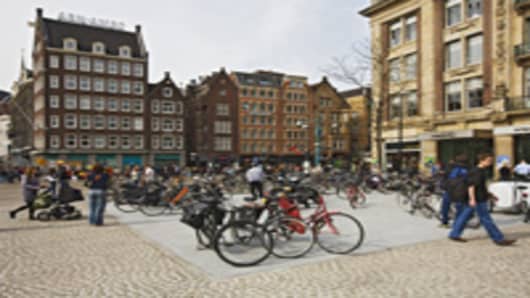Dutch Prime Minister and leader of the pro-euro center-right Liberal Party (VVD) Mark Rutte came in for serious criticism at an election debate on Tuesday night when he said that Greeceshould not get any more financial help from Europe.
“We have given support to Greece twice, loans totaling 240 billion euro ($300 billion) and that is enough,” website Dutchnews.nl reported Rutte as saying.
The statements were made during a live televized debate eight days before the Dutch go to the polls on September 12.
Rutte also noted that it would become unavoidable for Greece to leave the euro, but that this decision would be made by the country itself.
The Netherlands has witnessed a rise in anti-euro sentiment as its population grows tired of bailing out southern European countries. The Dutch economy, one of the strongest in Europe, is struggling and the country has been forced to introduce austerity measures to remain within the EU's budget rules. The euro zone debt crisis and its impact on the country have become a key issue of several parties' election programs.
Diederik Samsom, the new leader of the opposition Labor Party, the country's traditional leftist party, tried to downplay the strength of the prime minister's comments, saying Rutte has made similar threats in the past but has still agreed to providing additional funds for Greece.
Early last week opinion polls showed the hard-left Socialist Party, led by Emile Roemer, in the lead , but Tuesday’s debate and performances in two other televized debates last week hurt the socialist leader's chances as he came across as a political lightweight. That has allowed Samsom to gain ground and increased the likelihood of a scenario under which he forms a coalition with Rutte’s VVD.
Viewers of the poll regarded Samsom, a former Greenpeace activist, as the winner of the debate by a narrow margin as he impressed with controlled debating in style many said was prime ministerial, giving him 30 percent of the vote, against Rutte’s 28 percent.
According to Reuters estimates about a third of voters are still undecided, and the electorate cannot find a compromise over the dominant campaign issue: the euro zone crisis, the need for fiscal austerity at home, and what it all means for Dutch home prices and the country's generous welfare benefits and pensions.
A Maurice de Hond poll released right after the debate showed the Labor and the Socialist party are still neck-and-neck with each party being on target to take 27 seats in the 150 seat-chamber, and the Liberals leading the pack, expected to take 34 seats.
Rutte’s government supports Germany’s tough stance on the need for euro zone members to cut down their budget deficits, while the Socialist and Labor parties are against more austerity and have called for more time for the Netherlands to achieve EU-imposed budget targets.
The Labor party however has voted in favor of euro zone bailouts, unlike the Socialists.
This year’s election has pushed Geert Wilders, leader of the far-right anti-immigration and anti-euro Freedom Party policy into the background.
Wilders held considerable sway in the last government, but no other party wants to form a coalition with him.
By Liza Jansen, special for CNBC.com, twitter: @lizajansen


